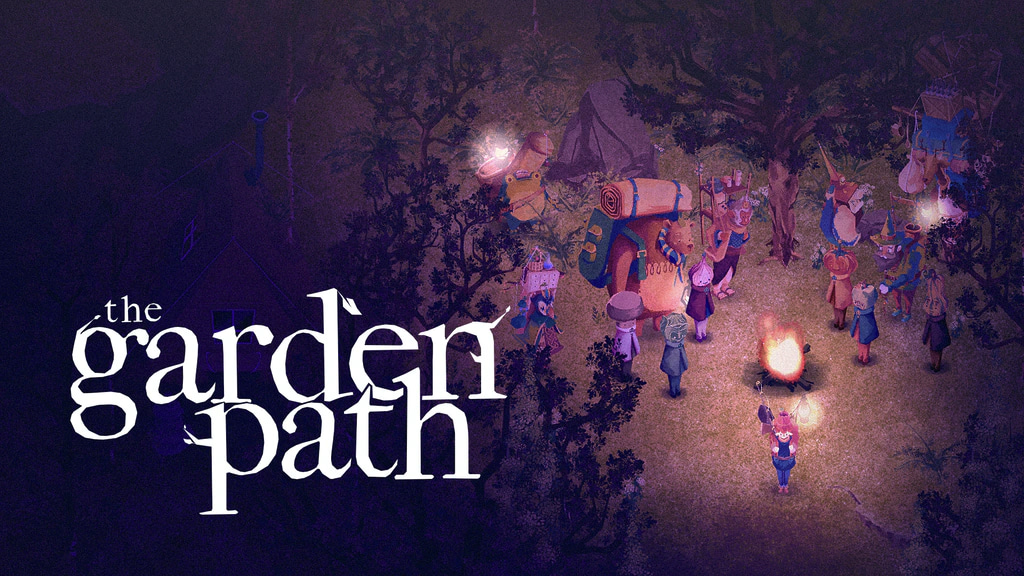Welcome to another developer interview following the introduction of the Godot Showcase page! This week, we are interviewing Louis Durrant about his game The Garden Path.
Introduce yourself in a few sentences.
Hi, I’m Louis Durrant, and I make games under ‘carrotcake’. I’m an illustrator living in Bristol, UK. The studio was me in my parent’s attic to start off, but now it’s me in a home-office, so we’re making inroads.
Introduce your project in a few sentences: description, supported platforms, release date, etc.
‘The Garden Path’ is really just the relaxed, whimsical social-sim I’ve always wanted on PC. Something slow-spaced that you can put on a podcast alongside, or just soak in the atmosphere - you know?
I want to keep things fairly low-key, as this is my first real release. I’m hoping to release the game this autumn or winter, but I’m not rushing myself. I’ll be supporting the game with more content after it’s released, but I want it to feel like a polished product worth the price tag on release day.
It will be a PC game at heart, but it is built from the ground up with a controller in mind. When the time is right, I think it would be an ideal game for the Nintendo Switch.
How did you discover Godot? When did you start using it? Do you have prior experience with other game engines?
I lurk around a number of forums for open source software and Godot was always in the back of my mind.
I remember opening it up many years back and having no idea where to start.
I introduced myself to game development during my time at university studying graphic design. It was an artsy enough course that you could go ahead and do things like that. I started with Visionaire Studio because you can build something pretty substantial without any code, but it helped me understand the fundamentals.
After I graduated in 2017 I told myself I’d start learning code and start learning Godot.
Nowadays working in the engine feels right at home.
Why did you choose Godot for your project?
I’ve been an advocate for open source software since I can remember, so Godot just seemed like the right fit. It’s a good feeling knowing that my work isn’t under the thumb of any kind of restrictive licensing.
I also liked the idea of being an early adopter at the time. There was buzz around the engine, but it still needs those flagship titles that people can point to. And that’s really very important, because if people are asking ‘how was this made’ and the answer is something open source, that’s a big accomplishment.
Something for me to aspire toward, anyway.
Which parts of the game development process did you enjoy the most while working on your project?
As ever the joy of game development is bringing each puzzle piece together and seeing the final result. I love art, animation, soundtracking and programming, and those are all tools to capture a certain mood I’ll have in mind.
It’s when each of those elements comes together in the way you intended, or perhaps even in a way you hadn’t, and it’s like a toy springing to life with it’s own quirks and character.
Which parts of the game development process did you find the most difficult to apply in your project?
The raw maths. Not that there’s an awful lot with a game like mine, but it’s surprising how often you need a certain formula to return the number you’re after.
I spent most of my maths lessons watching crows out the window. I’m fortunate enough to have some pretty mathsy friends who I can ping my questions to. They’ll tell me ‘use modulo’ or ‘you want the absolute number for that’ and I learn something new.
How has Godot helped you advance on your project? Which aspects of Godot do you consider to be its strength?
I love how modular everything feels. Just in the last few months or so I’ve started to really appreciate how you can break everything down, and start building your own systems within the engine.
Once I started understanding how you can make your own objects and resources, you can really start creating flexible methods tailored to your own game.
Which challenges have you encountered when using Godot?
Godot is still young, which is part of its appeal, but there isn’t always an easy solution for certain complex things you don’t necessarily need. The community is great and it’s growing, but it isn’t as big as more established engines, so the answers aren’t always out there when you go looking.
I spent longer than I care to admit trying to get a white outline drawn over multiple sprites, but couldn’t for the life of me get it to work. Something to do with a BackBufferCopy node, I got that far.
Which features would you like to see in future versions of Godot?
Honestly I feel spoiled by the engine already, so I’d feel cheeky asking for much more. Directional shadows for 2D are already on the roadmap I believe, and that would be a big step up for my game’s visuals.
And hey, being able to adjust easing in the AnimationPlayer of multiple properties would be mint.
Hat’s off to everyone working on the engine, I wish I had an ounce of the mental wherewithal to build or contribute to a project like this. Keep up the great work, and keep keeping it real.
Would you use Godot for a future project?
In a heartbeat.
The Garden Path is expected to be released in Autumn/Winter 2021. It currently has an ongoing Kickstarter campaign at the time of publishing this interview.
